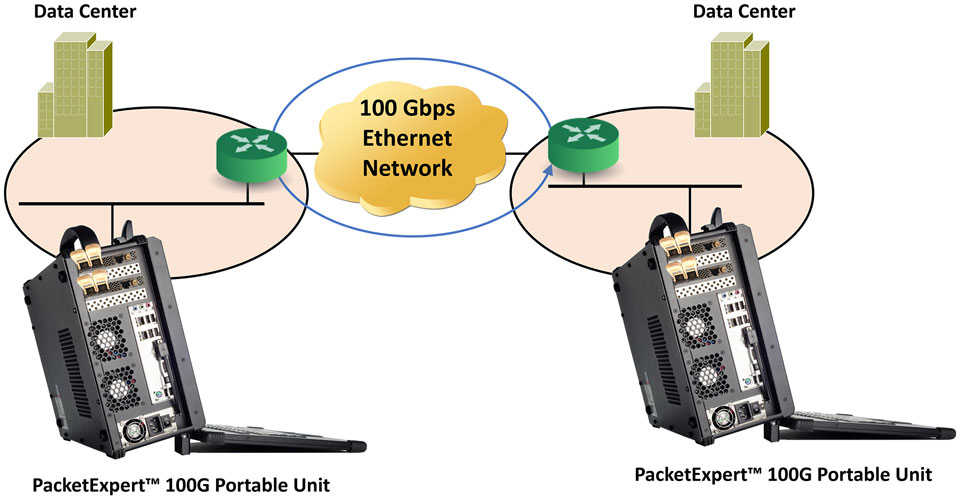GL Enhances Ethernet and IP Testing with PacketExpert 100G
Gaithersburg, Maryland, USA - Jun 29, 2024, GL Communications Inc., a global leader in telecom test and measurement solutions, addressed the press regarding their comprehensive Ethernet and IP testing solution - PacketExpert™ 100G. Designed for testing Ethernet and IP speeds up to 100 Gbps, PacketExpert™ 100G is ideal for evaluating high-speed backhaul networks and data center interconnects.

“GL’s PacketExpert™ 100G is a hardware platform designed for wire-speed Ethernet and IP testing up to 100 Gbps. It is a full-fledged PC with specialized Network Interface Cards, GL’s proprietary PacketExpert™ software, optimized RAM, storage, processing, and cooling. The Ethernet ports support speeds of 1 Gbps up to 100 Gbps.” said Vijay Kulkarni, CEO of GL Communications.
He further added, “Available in both portable and rack-mount configurations, it can accommodate up to eight 100 Gbps ports in a single appliance. The intuitive web-based user interface supports multi-user and multi-location access, allowing users to configure test parameters, start and stop tests, view real-time graphs, and export results. Furthermore, users can run Python scripts to automate complex testing scenarios.”
The PacketExpert™ 100G hardware platform includes two high-speed 100 Gbps QSFP ports (Port 1 and Port 2). These versatile QSFP ports also support 1 Gbps, 10 Gbps, 25 Gbps, 40 Gbps and 50 Gbps optical connections by utilizing QSFP+ adapters with respective SFP modules. This flexibility enables the platform to provide two optical ports for comprehensive Ethernet testing.
PacketExpert™ 100G can perform Bit Error Rate Testing (BERT), Loopback Testing, RFC 2544 Testing (throughput, packet loss, and latency measurements), and ITU-T Y.1564 methodologies. Each 100G port provides independent Ethernet/VLAN/MPLS/IP/UDP layer-wise testing at wire speed. BERT, RFC 2544, and Loopback applications are implemented on all transport layers including Layer 2 (Ethernet), Layer 2.5 (VLAN/MPLS), Layer 3 (IPv4/IPv6), and Layer 4 (UDP). ITU-T Y.1564 is a standard carrier ethernet Service Activation Test methodology that allows for complete validation of ethernet Service-Level Agreements (SLAs) in a single test.
Key Features
- Portable and Upgradable Hardware: Supports 2 x 100G ports, upgradeable to eight ports in two-port increments, using the QSFP28 form factor
- High-Performance Testing: Can generate and receive Ethernet traffic at 100% wire-speed (bidirectional 100 Gbps rate) with support for frame lengths from 64 bytes to jumbo frames (up to 16000 bytes)
- Real-Time Monitoring: Graphical representation of throughput, bit error rate, and sync loss count for BERT testing
- Advanced RFC 2544 Testing: Includes throughput, latency, frame loss, and back-to-back performance tests on various layers
- Smart Loopback Support: Auto layer detection and address swapping at MAC, IP, and UDP layers
- KPI Validation: Generates traffic at CIR, EIR, and Traffic Policing rates to ensure KPI validation, displaying metrics such as Information Rate, packet loss, round-trip delay and jitter for multiple streams, with pass/fail verdicts
- Comprehensive BERT Testing: Supports industry-standard PRBS patterns including 29-1, 211-1, 215-1, 220-1, 223-1, 229-1, and 231-1, as well as user-defined patterns. It can perform BERT at Ethernet (Layer 2), up to 3 Stacked VLAN (Q-in-Q), up to 3 Stacked MPLS (Layer 2.5), IP (Layer 3) and UDP (Layer 4). The platform handles full wire-speed BERT in both directions for electrical/optical ports, providing real-time graphical representation of throughput, bit error rate, and sync loss count over time
- Multi-device support: Supports multi-device configurations for simultaneous wire-speed BERT, RFC 2544 and loopback testing on multiple ports
- Python API: Enables scripting and automation for complex testing scenarios
 Back to Press Releases Index Page
Back to Press Releases Index Page